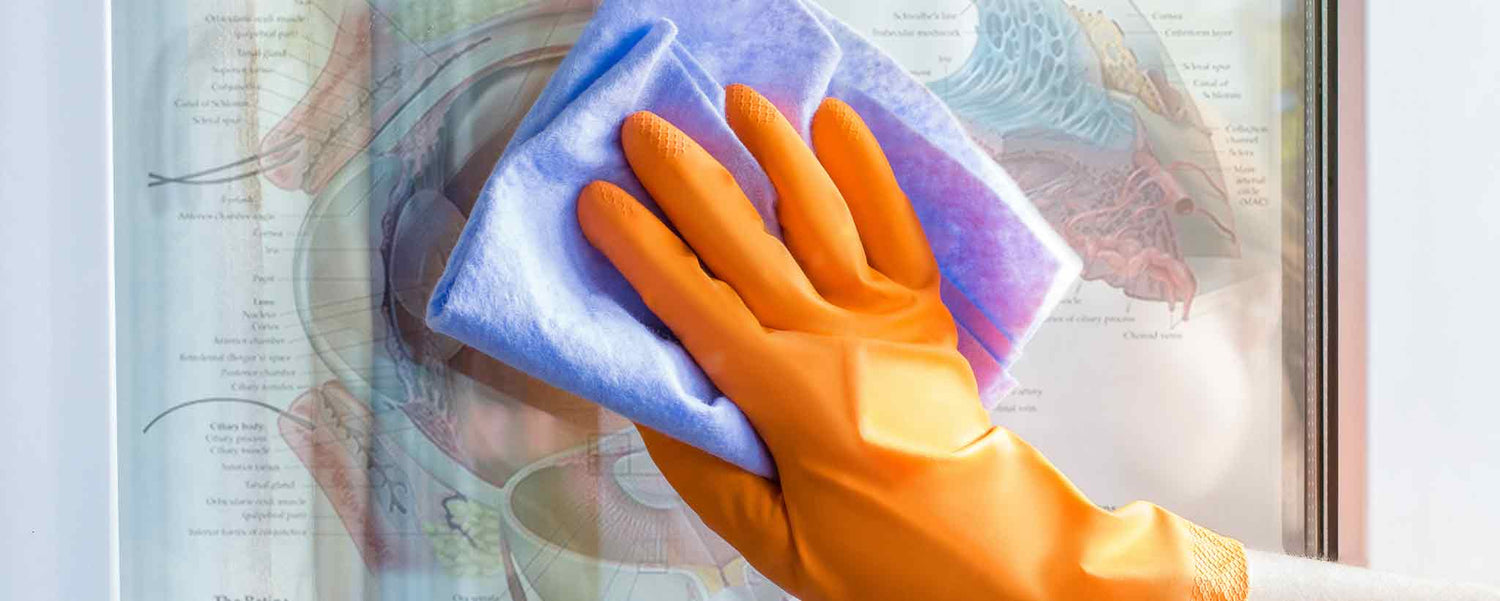COVID-19 Sanitation Protocol
The DeuPair Frame™ is available with lightweight PETG or thicker polycarbonate overlays. PETG has the same optical clarity and composition as water bottles. With the composition of eyeglasses, polycarbonate is crystal clear.
Polycarbonate has 200–250 times the impact resistance of glass.
The main advantage of synthetic material over glass is shatter resistance. Polycarbonate has 200–250 times the impact resistance of glass and is bendable in sheets. PETG is about 70 percent of that. Acrylic has 10 times the impact resistance of glass, can crack, and is not flexible. Both acrylic and polycarbonate are lighter than glass.
Polycarbonate is durable enough for eyewear, picture framing, police riot shields, garage door windows, other construction projects, and very thick pieces are bulletproof glass. Polycarbonate is also a common material for a barrier between customers and personnel within many stores and offices. Though it has excellent density, like most synthetics, it is susceptible to scratches and damage from caustic chemicals.
Shatterproof sheets are easier to ship than glass. With the need for frequent sanitation, how do you clean polycarbonate?
With the need to sanitize surfaces more frequently, exercise caution to preserve the life of your frame overlays. Never use abrasive cleansers or cleaning pads. Avoid harsh chemicals. Care for the clear sheets as you would valuable eyewear. The following cleaning techniques are based on standard industry practices.
General cleaning
As a frame overlay within offices, flushing with water is often impractical. Regular cleaning prevents dust buildup. You may remove dust and grit with compressed air (not the propellant) at a distance before wiping.
- Thoroughly pre-rinse with warm water to loosen and wash away surface material, grit and grime.
- Using a lint-free microfiber cloth or moist non-abrasive sponge, gently wash with a mild diluted soap or detergent. (See compatible cleansers below.)
- Rinse thoroughly with lukewarm clean water. To prevent water spots, thoroughly dry the sheet with a dry soft cloth.
Removing heavy oils and tars
Within sterile medical offices it is unlikely that greese and grime would accumulate. Regular cleaning prevents dust buildup.
- Thoroughly pre-rinse with warm water to loosen and wash away surface material, grit and grime.
- With a 50/50 water-isopropanol (diluted rubbing/
isopropyl alcohol) mixture, gently rub the area with a soft non-abrasive cloth. - Immediately rinse thoroughly with lukewarm clean water. To prevent water spots, thoroughly dry with a dry soft cloth.
Compatible Cleaners
The following cleaning agents are compatible with polycarbonate sheets using the manufacturer’s recommendations:
- Windex® Ammonia Free
- Joy®
- Palmolive Liquid®
- Top Job® Basic*
A problem with many cleansers is that manufacturers produce confusing variations. Some add ammonia, oils, citrus, or scents that impair effectiveness of the original product. *Proctor & Gamble has consolidated Top Job® into Mr. Clean®.
Incompatible Polycarbonate Cleaners
Do not use a squeegee or any of the following cleansers on polycarbonate sheets:
- ⚠️ Lysol®
- ⚠️ Pine-Sol®
- ⚠️ Formula 409®
- ⚠️ Acetone
- ⚠️ Ammonia
- ⚠️ Benzene
- ⚠️ Butyl cellusolve
- ⚠️ Gasoline
- ⚠️ Glycerin
- ⚠️ Toluene
Remove Scratches From Polycarbonate
Deep scratches and gouges made by sharp objects such as keys, screwdrivers, and knives cannot be repaired. Fine scratches may be reduced in severity or cosmetically hidden by using a buffing compound such as NOVUS 2 Plastic Fine Scratch Remover, followed by a cleaning and polishing agent like NOVUS 1.
At a higher cost, polycarbonate sometimes has a scratch-resistant coating or UV filter. Coatings wear off over time. This is accelerated with polishing. Overlays within DeuPair Frames do not have any coatings. Hygienic lamination for posters includes UV filter.
Overlay Sheet Thickness
The standard PETG sheets are 0.5 mm thick. Deluxe polycarbonate is 0.75 mm. Extra thick 1.5 mm polycarbonate is available. Large frames (22x28 inches and above) benefit from the stability of thick overlays.
In summary, polycarbonate has more impact resistance than glass but is prone to scratching. Three recommended cleaning products for DeuPair Frame overlays are Windex Ammonia Free, diluted rubbing alcohol, and NOVUS polish. Sanitize regularly with clean soft cotton or microfiber cloth to preserve the life of your frames and prevent the spread of germs.
Top Job and Joy are registered trademarks of Proctor & Gamble. Palmolive is a registered trademark of Colgate Palmolive. Windex is a registered trademark of S.C. Johnson & Son. Pine-Sol and Formula 409 are registered trademarks of The Clorox Company. Lysol is a registered trademark of Beckett Benckiser, Llc. DeuPair Frame is a trademark of ClinicalPosters.




